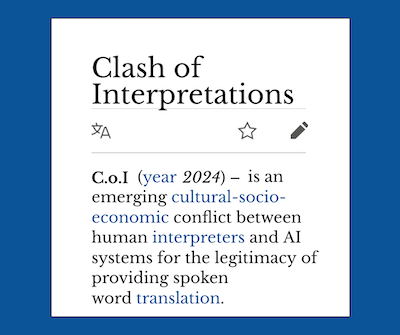In 1993, Samuel P. Huntington introduced the world to the concept of “The Clash of Civilizations” (article available here) positing that future conflicts would be driven by cultural and religious differences. Fast forward three decades, and we are witnessing the surge of a similar kind of cultural clash—not as important as the one described by the author, to be fair, but still of some interest for people involved in translation: I name it the “Clash of Interpretations”.
The clash of interpretation is an emerging conflict between human interpreters and AI translation systems, involving companies, professionals, and researchers. It revolves around the debate on who should be entitled to translate spoken words and is a struggle for space, rights and dignity in multilingual communication. This clash is emblematic of a broader trend affecting many professions impacted by automation. After years of simmering tensions, the conflict is now becoming more pronounced, and it is fairly easy to acknowledge its existence. Playing with the polysemic word ‘interpreting,’ it is, in a way, also a clash over how to interpret the evolving reality, and is therefore applicable to many areas affected by technological disruption.
A defining feature of this clash is the reliance on narratives rather than hard facts, on beliefs rather than knowledge. Each side feels entitled to be universally better than the other due to a strange alchemy that nobody can truly define, thus the terms of arguments are generally vague, unscientific, and mostly based on rhetoric, emotions and confirmation biases. Prospective of future changes are ignored. Instead of facts, the arguments seem based on different “interpretations” of reality and are therefore culturally driven. Sometimes, they even approach the fervor of religious orthodoxy. In this sense, they most resemble the thesis of Huntington’s article.
Recently, the clash has intensified, evidenced by the publication of petitions, open letters and position statements, on one side, and marketing campaigns and hyped claims, on the other. These are common forms of resistance and/or propaganda, but they appear often quite naive and dull. Social media has especially emerged as the perfect battleground for this narrative warfare, where posts facilitate both subtle and overt attacks. On social media, any weapon is allowed. Gurus are born, and people start to follow instead of trying to understand. As technology continues to advance, these conflicts are likely to escalate in a never-ending cycle of verbal and ideological confrontation. Polarization will continue until the new reality sets in. Unlike the clash of civilizations, the clash of interpretations will be brief. Eventually, looking back, this clash will be seen as naive and counterproductive, and time would have been better spent on the playground of rationality and mutual understanding. This clash, not to forget, is also characterized by being asymmetric in terms of power and impact on reality.
Personally, it is deeply disheartening to witness this decline in intellectual depth and in the lack of willingness to perform investigation of the truth. It goes as far as professional associations calling for a ban on teaching AI in university translation curricula. The stakes are high for those involved, and intense conflicts are inevitable. Everyone who has an interest, history teaches, feels compelled to fight to protect it. This is entirely understandable. And there are many things worth fighting for: fair compensation, working conditions, accessibility and democratization of translation, to name just a few. Ideally, it would be just more productive to overcome clashes based on rationality, i.e. sound arguments and facts (read science). However, clashes rarely follow this ideal; they are often a messy, contentious affair.

I am a relative newcomer to this very grave issue, sir. My concern is that, after years and years of striving to successfully graduate with my degree, and investing all my time and efforts into my dream career as a translator and interpreter, now, only One single year after graduating with my degree, I am now watching all my hopes and dreams of a lifelong career going down in flames—ignited by Ai. I ask that you see it from our—the interpreters and translators— perspectives. Let’s say that you when you had just graduated from University with your Doctorate in your degree. You are on top of the world. Your entire family and all your friends come to celebrate with you. . . You go find a job that’s your dream job, in which you want so dearly to turn it into a Career. Within two weeks, they tell you that they don’t need you to work for them and terminate you from employment. You ask why. The supervisor says, “Oh, we’ve purchased an Ai that does all you can do and more. Since it doesn’t require payment for it’s services, we did a cost analysis and realized it’s far more economically feasible to use it than to keep you on our payroll. . .” would you not be angry and extremely upset about that.
Dear Britton, thank you for your comment. As a trained Conference Interpreter with many years of experience in the past, and now as someone who continues to mentor the next generation of interpreters, I fully understand your perspective. While there are always reasons for frustration, there are also solutions that are far better than resorting to conflict. (By the way, I do not think the situation for interpreters is at the moment as bad as you are depicting in your answer.)
I explored this issue in my 2020 book, Essays on Conference Interpreting, and I especially recommend the section entitled “The Second Transition” beginning on page 38. https://www.degruyter.com/document/doi/10.21832/9781788928007/html
Thanks, James. Eager to read the chapter!